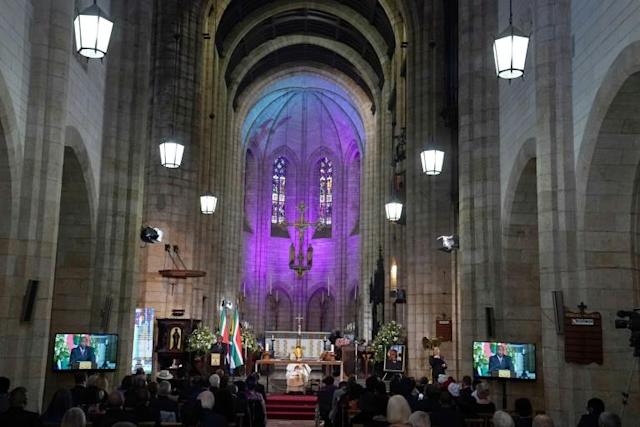
CAPE TOWN, Jan 2, 2022 (BSS/AFP) - South Africa's spiritual father
Archbishop Desmond Tutu, hero of the anti-apartheid struggle, was laid to
rest at dawn on Sunday in the Cape Town cathedral where he once preached
against the brutal white-minority regime.
Nobel Peace Prize winner Tutu died a week ago, aged 90, after a life spent
fighting injustice.
His ashes were "interred at St. George's Cathedral in a private family
service early today", an Anglican Church statement said.
Archbishop Thabo Makgoba placed his remains under an inscribed memorial
stone before the high altar.
He urged South Africans to "use this opportunity to turn a new page.
"Let us commit ourselves... to the radical, the revolutionary change that
he advocated," Makgoba said.
"Let us live as simply as he lived, exemplified by his pine coffin with
rope handles."
Some 20 members of Tutu's family, led by his widow "Mama Leah" were
present.
Famed for his modesty, Tutu had left instructions for a simple, no-frills
funeral with a cheap coffin, followed by an eco-friendly flameless cremation.
Family, friends, clergy and politicians had attended a requiem mass on
Saturday with President Cyril Ramaphosa leading the tributes.
"Our departed father was a crusader in the struggle for freedom, for
justice, for equality and for peace, not just in South Africa... but around
the world as well," said Ramaphosa.
"While our beloved (Nelson Mandela) was the father of our democracy,
Archbishop Tutu was the spiritual father of our new nation", lauding him as
"our moral compass and national conscience".
Under apartheid, the white-minority government cemented its grip imposing
laws based on the notion of race and racial segregation, and the police
ruthlessly hunted down opponents, killing or jailing them.
With Mandela and other leaders in prison for decades, Tutu in the 1970s
became the emblem of the anti-apartheid struggle.
He campaigned relentlessly abroad, administering public lashings to the
Western world for failing to slap sanctions on the apartheid regime.
After apartheid was dismantled and South Africa ushered in the first free
elections in 1994, Tutu chaired the Truth and Reconciliation Commission,
which exposed the horrors of the past in grim detail.
He would later admonish the ruling African National Congress for corruption
and leadership incompetence.
Tutu's moral firmness and passion went hand-in-hand with self-deprecatory
humour and a famously cackling laugh.